JCF to receive Excellence in Fundraising Award
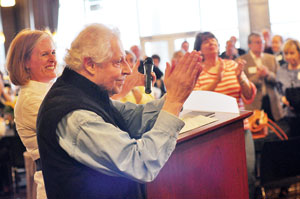 The Jewish Community Foundation of Greater Kansas City is the recipient of the Association of Fundraising Professionals Mid-America Chapter 2012 Excellence in Fundraising Award. This award recognizes local nonprofit organizations that have developed creative, resourceful and inspired campaigns, initiatives, projects or techniques that have grown and increased their fundraising infrastructure, program and results.
The Jewish Community Foundation of Greater Kansas City is the recipient of the Association of Fundraising Professionals Mid-America Chapter 2012 Excellence in Fundraising Award. This award recognizes local nonprofit organizations that have developed creative, resourceful and inspired campaigns, initiatives, projects or techniques that have grown and increased their fundraising infrastructure, program and results.
JCF is being recognized in particular for its leadership in the area of planned giving and the impact it has had on area non-profits through the Bushman Community Endowment initiative. Since 2007, BCE has provided comprehensive educational seminars, one-on-one consulting, marketing materials and $56,000 in incentive grants each to 13 Jewish agencies and synagogues. As a result, the Kansas City Jewish community has new commitments of an estimated $33 million in future endowment gifts.
Lauren Mattleman Hoopes, JCF’s executive director, said the foundation is very, very excited about this award.
“We are really honored and very proud because this award is not just about what the Jewish Community Foundation has done but because it’s really celebrating the program,” Hoopes said.
Hoopes noted that one reason this recognition is so special is because it comes from the general community.
“The profile of lots of Jewish organizations is pretty low in the general community and I think this is an example that we are really doing something innovative within the Jewish community that’s not being done in the general community,” Hoopes said.
Shelly Doucet, AFP’s National Philanthropy Day chair and the development chair of Académie Lafayette, said one reason JCF’s nomination was so impressive is because the BCE program is replicable and that was always part of the plan. She said by giving smaller organizations “who don’t have the capacity to do planned giving” the training to do just that is “furthering the cause of philanthropy to empower other organizations.”
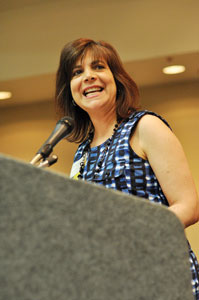 Hoopes is pleased this award “also acknowledges the great contribution that Stan Bushman made and the impact that his gift is having on the Jewish community.”
Hoopes is pleased this award “also acknowledges the great contribution that Stan Bushman made and the impact that his gift is having on the Jewish community.”
Doucet agreed, saying the award-winning BCE program started with Bushman’s seed money and his will to create a successful program.
“It used philanthropy to create philanthropy, which makes it unique,” Doucet said. “It’s clever, it’s efficient, it’s effective and it’s replicable.”
Merilyn Berenbom, a former president of JCF who currently serves as president of the Jewish Heritage Foundation, officially submitted the nomination. The original nomination was supported by letters written by Harold Kaseff, who has been a BEC team member for Congregations Ohev Sholom and Beth Shalom; Debra Goldstein, director of development for The Temple, Congregation B’nai Jehudah; and Don Goldman, executive director of Jewish Family Services.
Berenbom has been involved with BCE since its inception.
“She’s the one who came with me and Stan Bushman on our field trip to San Diego to look at an example of a model of a program in action. She definitely supported me in my vision of how we might bring a comprehensive approach to introducing planned giving techniques into the Jewish community,” Hoopes said.
Hoopes believes this award honors more than JCF.
“It also recognizes all of the Jewish communal professionals, all of the volunteers and all of the donors that responded so well to this idea. I think it really collectively belongs to the Jewish community,” she said.
As a result of BCE’s success, JCF has already been recognized in the national Jewish community as a leader and pioneer in the implementation of community-wide planned giving and endowment building programs. In 2011, JCF was selected by the Jewish Federations of North America to sponsor and host a national Jewish Legacy Forum and is now consulting with Jewish community foundations in other communities on how to replicate this unique fundraising model.
Now that the general community has also recognized JCF’s success with BCE, Hoopes believes it is a distinct possibility that others in the general community will want to learn more about such a program as well.
“We anticipate that we may have both other smaller Jewish communities in the region as well as potentially some non-Jewish charities that are interested in hearing about what it is that we’ve done and possibly talking to us about how that might work in the general community,” she said. “I think this will be the first that a lot of the general community not-for-profits here in Kanas City have ever heard of such a program.”
As far as Hoopes knows, no other program such as BCE, especially one that provided incentives to its participants, has ever existed in Kansas City before. She believes the financial incentive is one of the reasons BCE participants were attracted to and succeeded in their endeavors, especially as the severe economic downturn was setting in hard just as the program was kicking off.
“So the idea of getting $12,000 of unrestricted funds for doing work that was good for them anyway was really another attractive thing about the program. Coincidentally it was a godsend for a number of participants,” she said.
While BCE’s formal program is coming to a close, that doesn’t mean JCF’s commitment to the Jewish community will lessen.
“One important piece of the mission of the Jewish Community Foundation is to specifically build financial resources to promote sustainable Jewish organizations. We take that responsibility, that commitment to doing that, seriously,” Hoopes said. “We also have a separate but very important responsibility to the Jewish organizations themselves to make sure they are as effective and sustainable as we can help make them.”
During fiscal year 2011, the Jewish Community Foundation distributed more than $17.2 million in 2,800 separate grants to Jewish and secular charitable organizations.
AFP celebrates philanthropy in KC
The Jewish Community Foundation is not the only representative of the Jewish community being recognized when the Association of Fundraising Professionals Mid-America Chapter celebrates National Philanthropy Day. Henry Bloch will be honored as Individual Philanthropist of the Year at the reception and awards ceremony set for Nov. 1 at the National WWI Museum at Liberty Memorial. That evening Liberty Fruit, owned by Arnold and Carol Caviar, will be also be honored as Business Philanthropist of the Year.



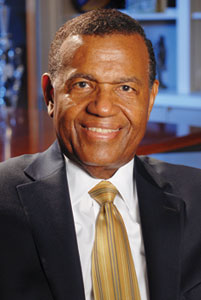 Leo E. Morton will be presented with the 2012 Henry W. Bloch Human Relations Award by the Jewish Community Relations Bureau|American Jewish Committee. He will be honored at the JCRB|AJC Human Relations Dinner Nov. 18 at The Westin Crown Center.
Leo E. Morton will be presented with the 2012 Henry W. Bloch Human Relations Award by the Jewish Community Relations Bureau|American Jewish Committee. He will be honored at the JCRB|AJC Human Relations Dinner Nov. 18 at The Westin Crown Center.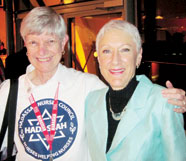
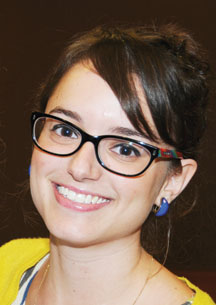 Spend a few minutes talking to new Israeli Emissary to the Jewish Federation Ophir Hacohen and you will discover right off the bat she is not a typical shlichah (female emissary). The first thing you will notice is that she does not have a heavy Israeli accent. That’s because she spent some of her formative years living in Tulsa, Okla., while her mother represented Israel in that Jewish community.
Spend a few minutes talking to new Israeli Emissary to the Jewish Federation Ophir Hacohen and you will discover right off the bat she is not a typical shlichah (female emissary). The first thing you will notice is that she does not have a heavy Israeli accent. That’s because she spent some of her formative years living in Tulsa, Okla., while her mother represented Israel in that Jewish community.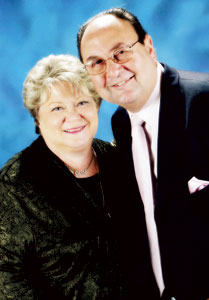 “Kansas City should not only be the center on the United States map, but also a major center on the American Jewish map,” said Rabbi Shmuly Yanklowitz, when describing his idea to start a Jewish Scholar in Residence Series at Kehilath Israel Synagogue. “Bringing the biggest rabbinic names to town will help to showcase how special our community is to those leaders … while giving us the chance to learn from the greatest leaders of our time.”
“Kansas City should not only be the center on the United States map, but also a major center on the American Jewish map,” said Rabbi Shmuly Yanklowitz, when describing his idea to start a Jewish Scholar in Residence Series at Kehilath Israel Synagogue. “Bringing the biggest rabbinic names to town will help to showcase how special our community is to those leaders … while giving us the chance to learn from the greatest leaders of our time.”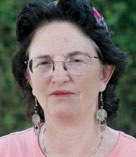 This summer we learned that a seven-year struggle with the government of Israel and the Orthodox community ended in a limited victory for Israeli Reform Rabbi Miri Gold. Rabbi Gold will be here at The Temple, Congregation B’nai Jehudah, to discuss this and other issues important to Reform Jews at erev Shabbat services Friday, Oct. 26. Worship begins at 6 p.m. She will be in Kansas City through Oct. 29.
This summer we learned that a seven-year struggle with the government of Israel and the Orthodox community ended in a limited victory for Israeli Reform Rabbi Miri Gold. Rabbi Gold will be here at The Temple, Congregation B’nai Jehudah, to discuss this and other issues important to Reform Jews at erev Shabbat services Friday, Oct. 26. Worship begins at 6 p.m. She will be in Kansas City through Oct. 29.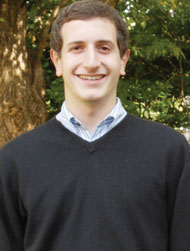 Variety is the seasoning of choice for Hyman Brand Hebrew Academy senior Sam Abrams. The 17-year-old participates in many different activities both through school and the Jewish community at large, but they all have a connecting thread: education.
Variety is the seasoning of choice for Hyman Brand Hebrew Academy senior Sam Abrams. The 17-year-old participates in many different activities both through school and the Jewish community at large, but they all have a connecting thread: education.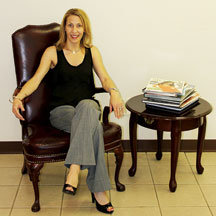 WOMAN WHO MEANS BUSINESS — Jamie Clayman Loud, owner and CEO of Clayman Promotional Group, was recently honored by the Kansas City Business Journal as one of 25 Women Who Mean Business. “They are without question some of the most energetic, enterprising women out there,” the journal noted. Loud runs the business, begun by her father and Congregation Ohev Sholom member Alvin Clayman in 1968, overseeing company operations, including merchandising, sourcing, sales, problem-solving and innovation, and market development.
WOMAN WHO MEANS BUSINESS — Jamie Clayman Loud, owner and CEO of Clayman Promotional Group, was recently honored by the Kansas City Business Journal as one of 25 Women Who Mean Business. “They are without question some of the most energetic, enterprising women out there,” the journal noted. Loud runs the business, begun by her father and Congregation Ohev Sholom member Alvin Clayman in 1968, overseeing company operations, including merchandising, sourcing, sales, problem-solving and innovation, and market development.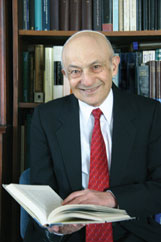 Rabbi Joseph P. Schultz, Ph.D., is well known in Kansas City for a variety of reasons. He taught at the University of Missouri-Kansas City from 1973 to 1999, eventually serving as the director of the Center of Religious Studies and the Danciger Judaic Studies Program. He also edited “Mid America’s Promise: A Profile of Kansas City Jewry,” in 1982, a book widely recognized as a concise history of Kansas City and used by this writer as a reference book on many occasions.
Rabbi Joseph P. Schultz, Ph.D., is well known in Kansas City for a variety of reasons. He taught at the University of Missouri-Kansas City from 1973 to 1999, eventually serving as the director of the Center of Religious Studies and the Danciger Judaic Studies Program. He also edited “Mid America’s Promise: A Profile of Kansas City Jewry,” in 1982, a book widely recognized as a concise history of Kansas City and used by this writer as a reference book on many occasions.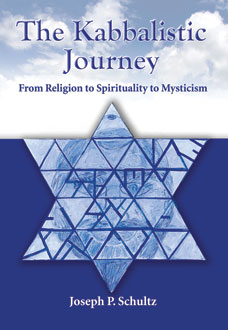 Dr. Schultz retired from UMKC in 1999 and moved to Golden, Colo. He continued teaching in Colorado part-time at three universities — the University of Denver, Naropa University (a Buddhist-sponsored university) and the University of Colorado, both in Boulder. In 2007 the Schultzes moved back to Brookline, Mass., where he began his career.
Dr. Schultz retired from UMKC in 1999 and moved to Golden, Colo. He continued teaching in Colorado part-time at three universities — the University of Denver, Naropa University (a Buddhist-sponsored university) and the University of Colorado, both in Boulder. In 2007 the Schultzes moved back to Brookline, Mass., where he began his career.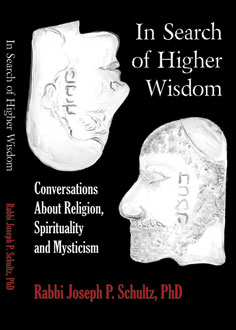 “I had a feeling that since she was so much a part of the discussions that went into this book that she would have a far more intuitive sense of the kind of art that should go into something like this and she did,” the author and proud father said.
“I had a feeling that since she was so much a part of the discussions that went into this book that she would have a far more intuitive sense of the kind of art that should go into something like this and she did,” the author and proud father said.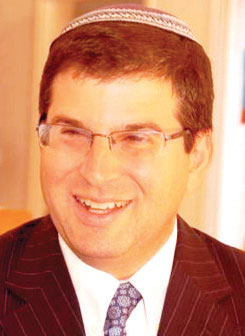 We are hearing more and more about the divide in Israel between Orthodox Jews, non-Orthodox and even secular Jews. Next weekend Congregation BIAV will host a scholar in residence who is well known across the world for his work in helping Jews bridge that divide.
We are hearing more and more about the divide in Israel between Orthodox Jews, non-Orthodox and even secular Jews. Next weekend Congregation BIAV will host a scholar in residence who is well known across the world for his work in helping Jews bridge that divide.